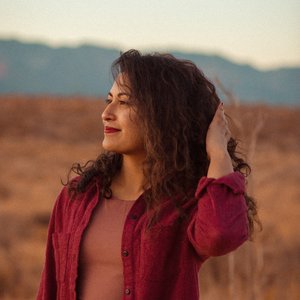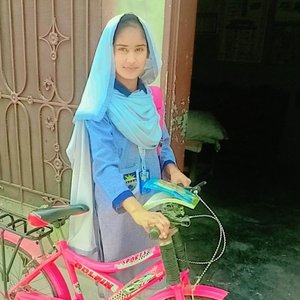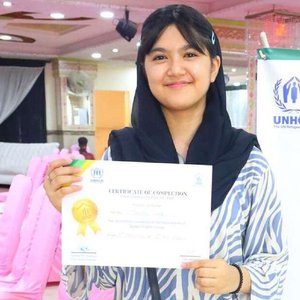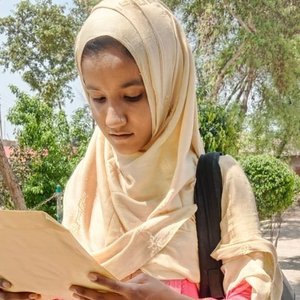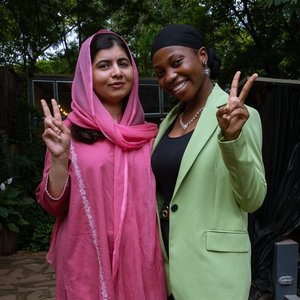Protecting progress for girls’ education
With the SuperGirls program, refugee girls in Jordan are able to connect with each other, catch up on their lessons and begin to heal from trauma-induced anxiety. (Courtesy of the Collateral Repair Project)
For refugee girls in Amman, Jordan, the SuperGirls program is a sanctuary. It’s a place where they dance, paint, sing and do yoga. It helps them connect with each other, catch up on their lessons and begin to heal from trauma-induced anxiety. But this year, the program looks a little different.
Because of the COVID-19 crisis, the nonprofit Collateral Repair Project (CRP) cannot hold in-person SuperGirls meetings. Instead, Rana Bader, the organization’s program coordinator, checks in with girls’ parents via WhatsApp. Because she believes that physical fitness is key for mental health, she sends videos of herself doing yoga so that the girls can stay active while at home. But Rana worries that the pandemic will undo much of the progress SuperGirls has made.
Jana Amin giving a TedX-Youth Talk on changing the narrative around Muslim women. (Courtesy of Norm Miller)
She tells me about one girl, Catrin, who came to Jordan from Iraq after her predominantly Christian hometown was captured by ISIS. Catrin’s parents, like other Iraqi parents, refused to let her go to school, fearing that she would be attacked because of her religion. After Catrin enrolled in the SuperGirls program, she learned to interact with Muslims and Christians alike. The transition was not easy. At first, she would hide under the table and refuse to talk until prompted. By the end of the program, Catrin had come out of her shell. She enrolled in school, began leading yoga stretches and helped encourage other Iraqi girls to enroll in school. But now, Rana worries about what will happen to Catrin if Jordan’s strict curfew continues. Catrin’s parents cannot go to work given the lockdown measures, leaving them with no source of income. Rana worries that Catrin’s parents will prioritize her two older brothers’ education because they do not have the means to send all three children to school.
Asha Athman, director of CRP’s women and community outreach programs, explains that for many families, the cost of education is often too high in good times. The additional strain on resources during a global crisis will prevent even more girls like Catrin from going to school. A recent Malala Fund report found that during the 2014-2015 Ebola crisIs, increased rates of poverty, household responsibilities, child labor and teenage pregnancy as well as restrictive school policies prevented many girls from returning to the classroom. Their research estimates that 20 million more secondary school-aged girls could be out of school post COVID-19. Research conducted by the United Nations Population Fund and its partners also found that the disruption to programs to prevent child marriage will result in an additional 13 million children being married over the next decade, the majority of whom are girls.
As a volunteer English teacher with CRP, I have seen how SuperGirls teaches girls to advocate for themselves and pursue their own education. Without the ability to meet in person and without the technology to connect virtually, these girls are falling behind on their schooling and losing their self-confidence. Organizations like CRP are finding creative ways to help girls learn from home — but they can’t fight alone.
We can all find ways to take action for girls’ education, even from our homes. For my 17th birthday, I organized #17for17, a one-day virtual event featuring 17 speakers from 17 countries advocating for girls’ education. Watch here to learn more about global efforts to keep girls in school post-COVID from youth activists, CEOs of nonprofits, performers, technologists, artists and more. Online fundraisers are a great way to support your favorite organizations (check out birthday fundraiser for the SuperGirls program). If you can donate time, you can sign up to become a virtual volunteer for the Collateral Repair Project and help teach English to refugees of all ages. And I highly recommend filling your social feeds with some of the incredible women speaking out for education, like Alaa Murabit, Maryam and Nivaal Rehman, Aurélia Durand, Wadi Ben-Hirki, Chimamanda Ngozi Adichie and Samantha Power.
Educating girls is a global imperative. We must all help safeguard it like never before.
Correction: July 13, 2020 An earlier version of this article featured a miscalculated statistic. Malala Fund’s report estimates that 20 million more secondary school-age girls could be out of school after the COVID-19 crisis has passed, not 10 million.
 Read more
Read more








